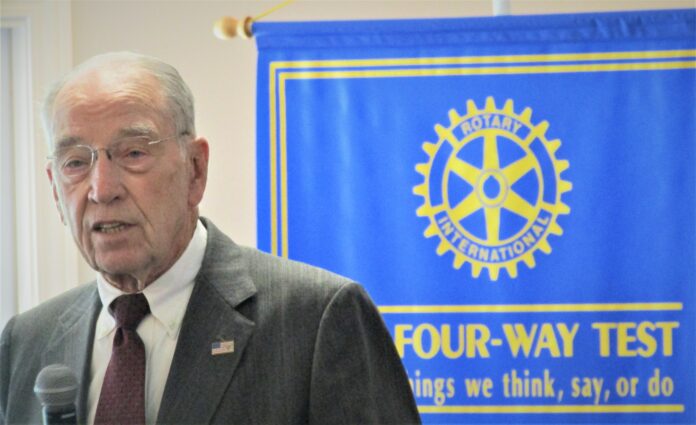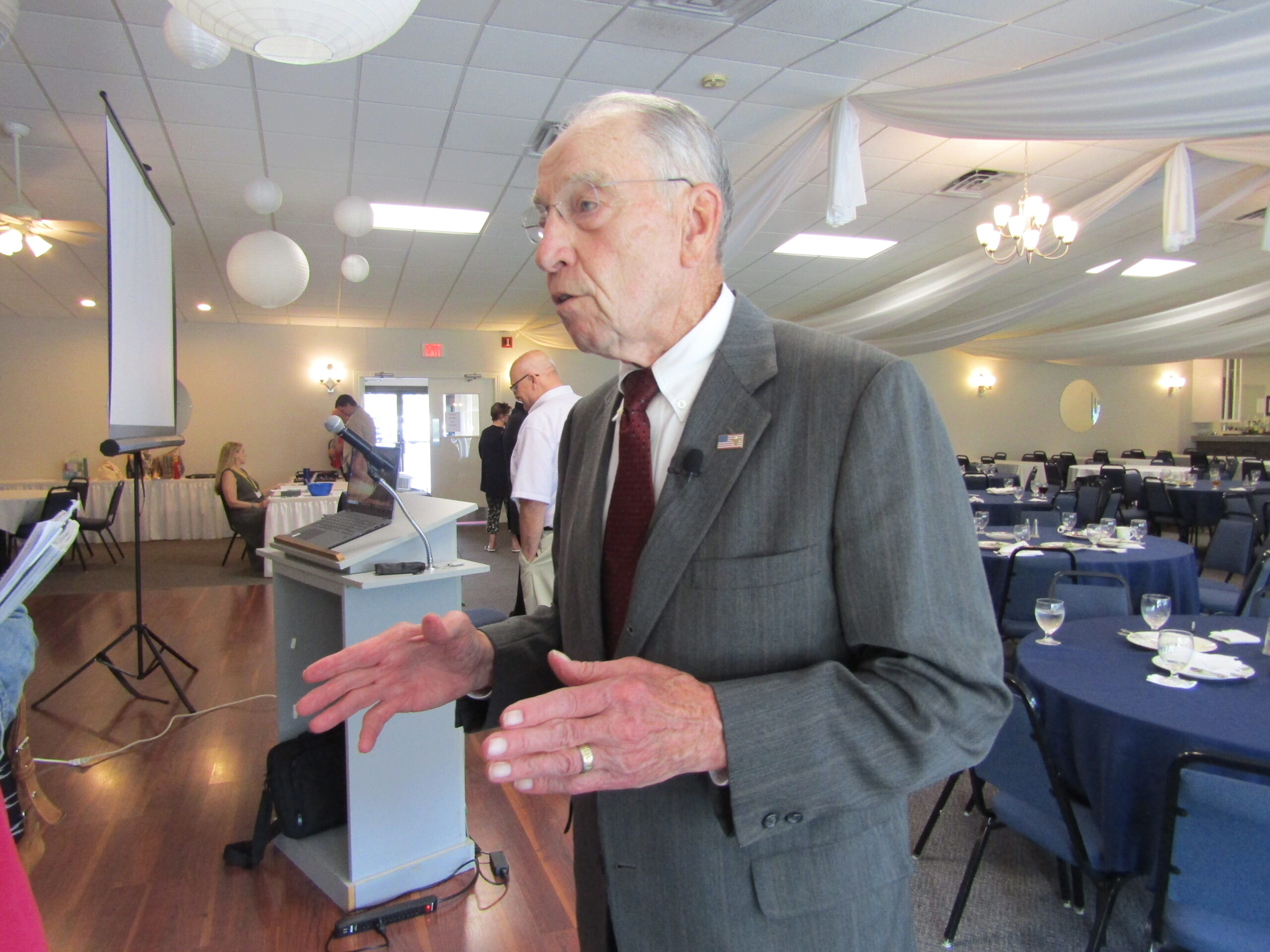
U.S. Sen. Chuck Grassley is confident a federal debt limit deal will be hammered out before a default, wants transparency for medical drug prices and is worried about our defense industry’s capability of helping defend the country in time of war.
Those were some of the top subjects the longtime Iowa Republican senator covered during a short speech and longer question-and-answer session Wednesday afternoon, May 24, at a Bettendorf Rotary Club meeting at the Tanglewood Pavilion, Bettendorf.
The senator, who is now on Memorial Day recess from Congress, said he has visited 13 Iowa counties in the past few days to give updates on legislation as well as field questions and concerns from Iowans. One of the top concerns is the ongoing battle to reach a debt ceiling agreement.
In Washington, House Speaker Kevin McCarthy said Wednesday that House Republicans and the White House remain “far apart” on reaching consensus on a plan as the threat of a historic default on the nation’s debt grows.
However, Mr. Grassley said he fully believes a deal will be reached.
“It would be stupid to default. … I’m very confident we will have an agreement,” he told members of the media shortly after the Rotary meeting, which attracted about 70 people.
He added that the country has been in this debt ceiling showdown at least 11 times since 2011, and has been able to eventually reach a deal as the deadline approaches.
Related to the debt ceiling debate, the senator fielded a question concerning the federal government’s ability and willingness to cut spending in the future. Mr. Grassley said that he was somewhat optimistic that could be done at a certain level, but it “will take the discipline of a constitutional amendment like states have” to largely limit future spending.
The longtime Republican senator appeared to be much less optimistic when he was asked about the greatest threat currently facing the U.S. According to Mr. Grassley, that biggest threat is our defense industry’s capability of helping defend the country in time of war.
“Our defense industry’s capability of building the material is about where it was in 1940, before World War II. There were 13 major defense industries and now we are down to two. They kept saying, ‘There are so many defense industries we can’t afford it; you’re going to have to merge.’ Probably merged too much,” he added.
To make the situation more dire, the military is having major problems filing its ranks. Today, the armed forces are 20% short of their recruiting goals.
The 89-year-old senator reminded the crowd that during the World War II era, some 16 million Americans were in uniform – and almost every family in the country had a friend or family member in the service. Today, under 1% of the people in the U.S. serve in the military. That means many people in the country have no connections to the armed services, and sometimes no support of the military, he added.
“There is no appreciation of what the military does. … The number one responsibility of the federal government is to protect the American people,” Mr. Grassley said.
During Wednesday’s meeting, the senator also told the crowd about legislation he helped introduce last year that would empower the Federal Trade Commission (FTC) to increase drug pricing transparency and hold pharmacy benefit managers (PBMs) accountable for unfair and deceptive practices that drive up the costs of prescription drugs at the expense of consumers.
The Pharmacy Benefit Manager Transparency Act, which was also introduced by U.S. Sen. Maria Cantwell (D-Wash.) last May, would ban deceptive unfair pricing schemes; prohibit arbitrary claw backs of payments made to pharmacies; and require PBMs to report to the FTC how much money they make through spread pricing and pharmacy fees.
“I hear stories about rising drug costs all the time at my 99 county meetings, and middlemen pocketing consumer and taxpayer money is a big reason for those high costs,” he said in a news release. “Pharmacy benefit managers and other intermediaries in the pharmaceutical supply chain must be held accountable for increasing the cost of healthcare in the United States. It is critical for Congress to direct the Federal Trade Commission to go after these arbitrary, unfair and deceptive practices while also establishing more transparency and accountability.”
The Pharmacy Benefit Manager Transparency Act has been in Congress for about a year and is still being debated.
Some of the other subjects discussed during the Wednesday meeting included:
- China buying farmland: The senator said that he would likely vote for potential legislation to prevent China from buying farmland.
- Actions of the Federal Reserve: He said the Fed is taking the right actions now to help the economy, but those actions started months late.
- Federal estate tax: The current estate tax exemption amount is $12.92 million per person, or $25.84 million per married couple. This means people with estates valued below this do not have to pay any federal estate tax. However, estates valued above this amount are subject to a tax rate of up to 40%. The increased exemptions are set to remain in place until Dec. 31, 2025. After that, the exemption will revert to $5 million. Mr. Grassley said this will be a big issue in 2025, and he hopes to keep the current exemptions in place.









